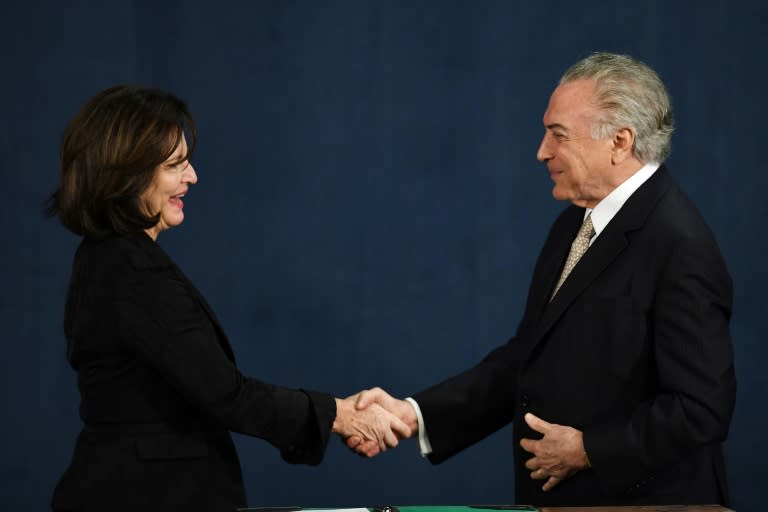Corruption-plagued Brazil gets new chief prosecutor
Brazil's newly sworn in chief prosecutor vowed Monday that no one would be "above the law" but signalled a possibly less aggressive approach to an avalanche of corruption investigations, including against President Michel Temer. Raquel Dodge replaced the hard hitting Rodrigo Janot who last week rounded off his dramatic term in office by charging Temer with racketeering and obstruction of justice. Dodge, 56, was nominated by Temer and some analysts see the changeover as heralding a slowdown of Brazil's huge "Car Wash" anti-graft operation. Temer has railed repeatedly against what he calls an out of control judiciary, a theme echoed by many in Congress who also have been accused of corruption. At her swearing in ceremony in Brasilia, which was attended by Temer, Dodge vowed to "defend democracy" and said that her office would make sure that "no one is above the law and that no one is below the law." But indicating at the very least a less abrasive approach than Janot, she stressed the need for "harmony" between the different branches of government "as a requirement for the stability of the nation." Although she said that Brazilians "cannot tolerate corruption and not only hope for, but expect results," she barely mentioned her predecessor and never referred specifically to "Car Wash." One of Dodge's first big tasks as prosecutor general will be to oversee the latest charges brought against Temer by Janot last Thursday. The charges will soon be sent to the lower house of Congress for debate and, if approved, sent back to the Supreme Court which would open a trial, resulting in Temer's suspension for 180 days. A first criminal charge of bribe-taking filed by Janot in June was handily rejected by Temer's allies in Congress. And analysts agree overwhelmingly that legislators will likewise toss out the latest charges. - Economic reforms crossroads - Beyond the Temer charges, Dodge inherits the enormous case load of Janot's probes and prosecutions targeting scores of other politicians and executives. About a third of Temer's cabinet is under investigation. Former president Luiz Inacio Lula da Silva has been convicted of taking bribes and faces five more graft trials, while charges have also been lodged against former presidents Dilma Rousseff and Jose Sarney and Fernando Collor de Mello. The switch in head prosecutor also comes at a crucial time in domestic politics. Temer is attempting to steer through far-reaching pension reform to strip back what his government says is an unsustainably generous system. While he has strong market support for this and other austerity reforms aimed at ending Brazil's economic slump, the measures are unpopular and the president has been forced to spend much of his political capital to shore up support against the corruption charges. However, Temer is now seen as stronger than he has been for months and Janot's departure will boost his position further. Although the scandals have been severely embarrassing, leading politicians are seen as unwilling to rock the boat by sending Temer to trial ahead of presidential elections in October of next year. Temer, who is deeply unpopular, is not expected to seek a new term.



